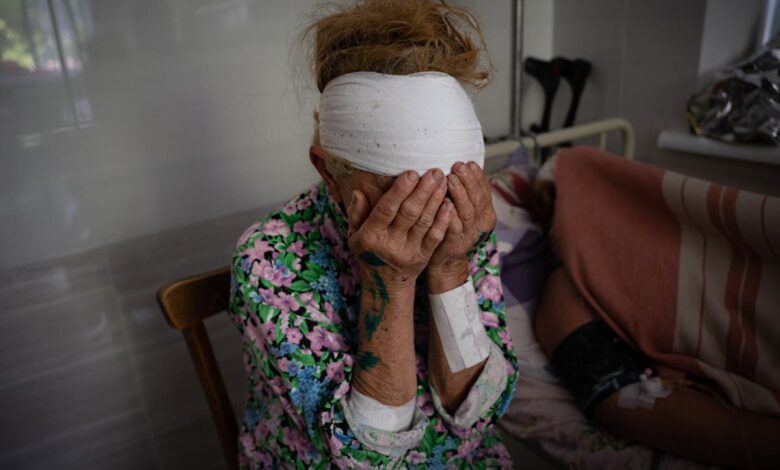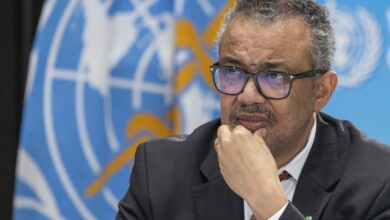‘I was born in war, I will die in war’: Trying to survive on Ukraine’s new front line

Olena and her family were trying to bury their elderly neighbour when the sky cracked open, spitting shards of shrapnel that split open her teenage daughter’s head.
Her husband Nikolai, 52, was a little further up the hill in the Ukrainian frontline village, and still holding the neighbour’s body, which he used to shield himself from the worst of the blast. Cowering under a corpse, he could only watch powerless with horror as his wife, and his child Anastasia, 15, were shredded by the Russian strike in their own back garden.
Their village in Donetsk is quite literally on the front line of the ferocious war that started with Vladimir Putin’s invasion of Ukraine in February. Located just a few metres into patchily held Ukrainian territory, it may soon be engulfed by Russian troops, who have pressed on with an advance into Donetsk after capturing the whole of the adjacent Luhansk region.
And so it is a hellish no man’s land, where villagers cower in their basements as the tug of war rages above them.
“I was screaming Anastasia’s name, I was screaming Anastasia’s dead,” Olena, 51, says in tears from her hospital bed in Kramatorsk, a city itself under attack, around 18 miles south of the village. Medics tending to her say she received severe wounds to her head, arms and legs in the bombing, which took place the day before the interview.
“My daughter’s head had been cracked open, you could see her brain. She is my only child,” she adds before breaking off.
Comforting her was another of Olena’s neighbours, Olga, who had overseen Anastasia’s burial at dawn that morning, only to be injured herself in shelling a few hours later as she tried to pick raspberries. Olga had also been ferried to Kramatorsk hospital that afternoon, still concussed with a serious head injury.
“Every day a house is hit in our village by everything, even white phosphorus,” she tells The Independent shakily.
“It’s too unsafe to properly bury people. Now we just wrap the bodies in a blanket and place them in holes in our own gardens.”
Stuck in the middle and fearful of repercussions from either side, the trio asked for their identities and the location of their village to be kept secret. They were reluctant to attribute blame for the violence claiming they had been attacked from both sides.
“We just want peace, we want an end to this war,“ Nikolai, the husband, adds, desperately.
That is unlikely. This eastern slice of Ukraine is now the deadly focus of President Putin’s assault on the country.
On Monday he declared victory in Luhansk, the oblast adjacent to Donetsk, just one day after Ukrainian forces said, outgunned, they had been forced to withdraw from Lysychansk, the last remaining bulwark of resistance in the area.
The governor of now-occupied Luhansk and the local authorities in Kramatorsk agree that seizing all of Donetsk is Moscow’s next objective. Cities like Kramatorsk and next door Slovyansk – where evacuations of civilians are hastily being organised – are now in the line of heavy fire. There were reports on Tuesday that Russian positions were just a few kilometres from Slovyansk.
“The enemy already started ‘working’ with artillery and aviation in the Donetsk region. Most likely they will keep using the strategy of ‘scorched earth’, meaning – first they will destroy and then attack,” Serhiy Gadai, the governor of Luhansk, tells The Independent.
Vitali, a trauma doctor in Kramatorsk, says the hospital he works at is reduced to using household hand drills on patients
“The goal of the Russians is and always was to take the entirety of Ukraine. They will only stop where the Ukrainian army will halt them,” he adds.
Igor Eskov, a spokesperson at the local administration of Kramatorsk says his city is preparing for the worse, expecting Russia and its affiliated forces to make a “pincer movement” on them, coming east from the recently captured Lysychansk and north from the territories above Slovyansk.
“After Mariupol this is the biggest city left in Donetsk; it is the most important politically and strategically in the region,” he tells The Independent from outside the sandbagged local authority buildings.
“Kramatorsk is the administrative centre for Donetsk. They are going to push to get as much territory as possible.”
Pedestrians walk past the tail section of a rocket which is embedded in the ground, in Kramatorsk on Monday, the day after a Russian rocket attack
Vitali points to the surgical drills needed to treat patients injured by cluster bombs and mines





